Top Open Source Projects to Watch in 2025
A deep dive into eight leading open source projects in 2025 that are challenging traditional enterprise software with their focus on user experience, deployment flexibility, and sustainable development practices.

Open source SaaS continue to reshape modern development, with a new wave of venture-backed startups leading the charge. This curated list spotlights eight high-growth open source projects that are challenging traditional proprietary tools in 2025. Unlike typical open source roundups, we've focused specifically on well-maintained projects that are gaining significant traction in production environments.
What sets these projects apart is their commitment to both open source values and commercial viability. Each offers a generous community edition – available through cloud hosting or self-deployment – allowing teams to thoroughly evaluate them before making any commitments. Their strong backing, active development cycles, and growing enterprise adoption make them particularly noteworthy for organizations looking to modernize their tech stack.
Below, we'll dive deep into each project, following a consistent format to help you evaluate their potential fit for your organization. From project management to content delivery, these tools represent the next generation of open source innovation.
Plane (Project Management)
Plane is an open source project management platform that strikes a perfect balance between simplicity and power. Built as a modern alternative to complex tools like Jira, it offers an intuitive interface with progressive feature activation - teams can start lightweight and enable advanced features as they grow. The community edition, which is fully open source, comfortably supports teams of up to 50 members with core project management capabilities. For larger organizations or those needing enterprise features like SSO and advanced analytics, a commercial edition is available through both cloud and self-hosted deployments.
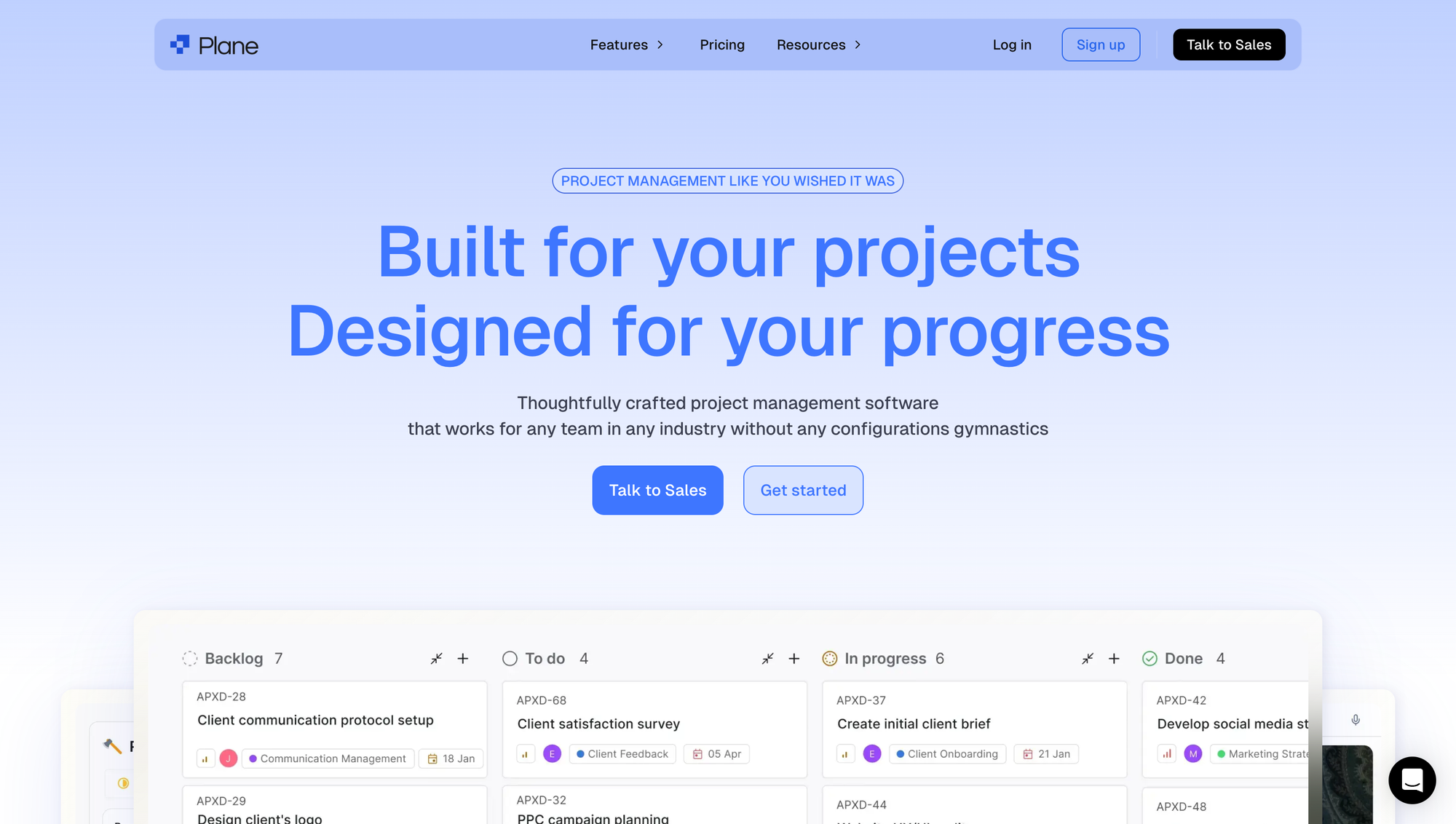
License: AGPL-3.0 | Stars: ~30,000 stars
GitHub | Website | Documentation | Discord
Deployment Options: Self-hosted (Docker available, requires Node.js v16+, PostgreSQL, Redis) with 2 CPU/4GB RAM minimum; Plane Cloud offering with 99.9% SLA for managed hosting.
Pricing: Free self-hosted community edition (suitable for most teams); Cloud and Enterprise editions starting at $5/user/month for advanced features (SSO, analytics).
Core Features & Capabilities
- Issue Tracking: Rich text editor with file uploads, sub-tasks, issue linking, and custom properties
- Sprint Planning: Cycles with burndown charts and progress tracking
- Project Organization: Break down projects into modules; customize and share filtered views
- Documentation: AI-powered Pages with rich text editing and issue conversion
- Analytics Dashboard: Real-time project insights and trend visualization
Plane maintains a vibrant open-source ecosystem with around 100+ monthly active contributors and a responsive core team that typically addresses GitHub issues within 48 hours. Their consistent release cycle - pushing minor updates bi-monthly and major releases monthly - demonstrates strong project momentum and stability.
The project is well-supported by venture capital funding, enabling a dedicated enterprise support team and investment in comprehensive documentation. Their detailed guides and best practices make it easy for new users to get started while providing advanced deployment scenarios for enterprise users.
PostHog (Product Analytics)
PostHog is an open source product analytics and feature management platform that combines analytics, experimentation, and user research tools in one unified suite. It stands out by offering a complete toolkit for product teams - from session recording and heatmaps to feature flags and A/B testing - all with a developer-first approach. Their community edition supports unlimited events for self-hosted deployments, while the cloud version includes a generous free tier (up to 1M events monthly). With over 14k GitHub stars and strong venture backing, PostHog has emerged as a compelling open source alternative to Amplitude and Mixpanel.

License: MIT expat license | Stars: ~22,000
GitHub| Website | Documentation| Community
Deployment & Setup: Self-hosted available via Docker/Kubernetes (requires 4+ CPU, 8GB+ RAM, PostgreSQL, ClickHouse) with unlimited events; PostHog Cloud offering with generous free tier up to 1M monthly events.
Pricing: Free self-hosted community edition with all core analytics features; Cloud and Enterprise editions with usage-based pricing for advanced capabilities (SSO, roles, dedicated support).
Core Features & Capabilities
- Flexible Analytics: Event autocapture and custom tracking with ready-made visualizations and SQL capabilities
- Product Intelligence: Session replays, heatmaps, and network monitoring with console logs for deep user insights
- Feature Management: A/B testing and feature flags with targeted rollouts and automated performance analysis
- User Research: Customizable surveys, cohort targeting, and web analytics (GA4 alternative)
- Data Infrastructure: CDP capabilities for external service connections and efficient data management
PostHog earned its spot for several compelling reasons. In a crowded analytics space, it distinguishes itself as the only comprehensive open source platform combining product analytics, session recording, and experimentation tools. Their rapid development cycle and strong maintainer team consistently deliver enterprise-grade features while keeping the community edition robust. The exceptional developer experience - from their detailed documentation to their polished website and extensive API coverage - demonstrates their commitment to the developer community. Backed by significant venture funding ($27M+ raised), PostHog has proven its sustainability while maintaining true open source values, making it a reliable choice for both startups and enterprises moving away from proprietary analytics solutions.
Dub.sh (Link Management)
Dub.sh is an open source link management infrastructure combining enterprise-grade URL shortening with powerful analytics capabilities in one streamlined platform. Built with a modern tech stack (Next.js 13, Prisma, PlanetScale), it delivers microsecond-fast redirects while offering advanced features like custom domains, QR generation, and real-time analytics. The community edition provides essential link management tools, while the cloud version includes a generous free tier (up to 1,000 clicks monthly). Dub.sh has established itself as a robust open source alternative to Bitly and Short.io.
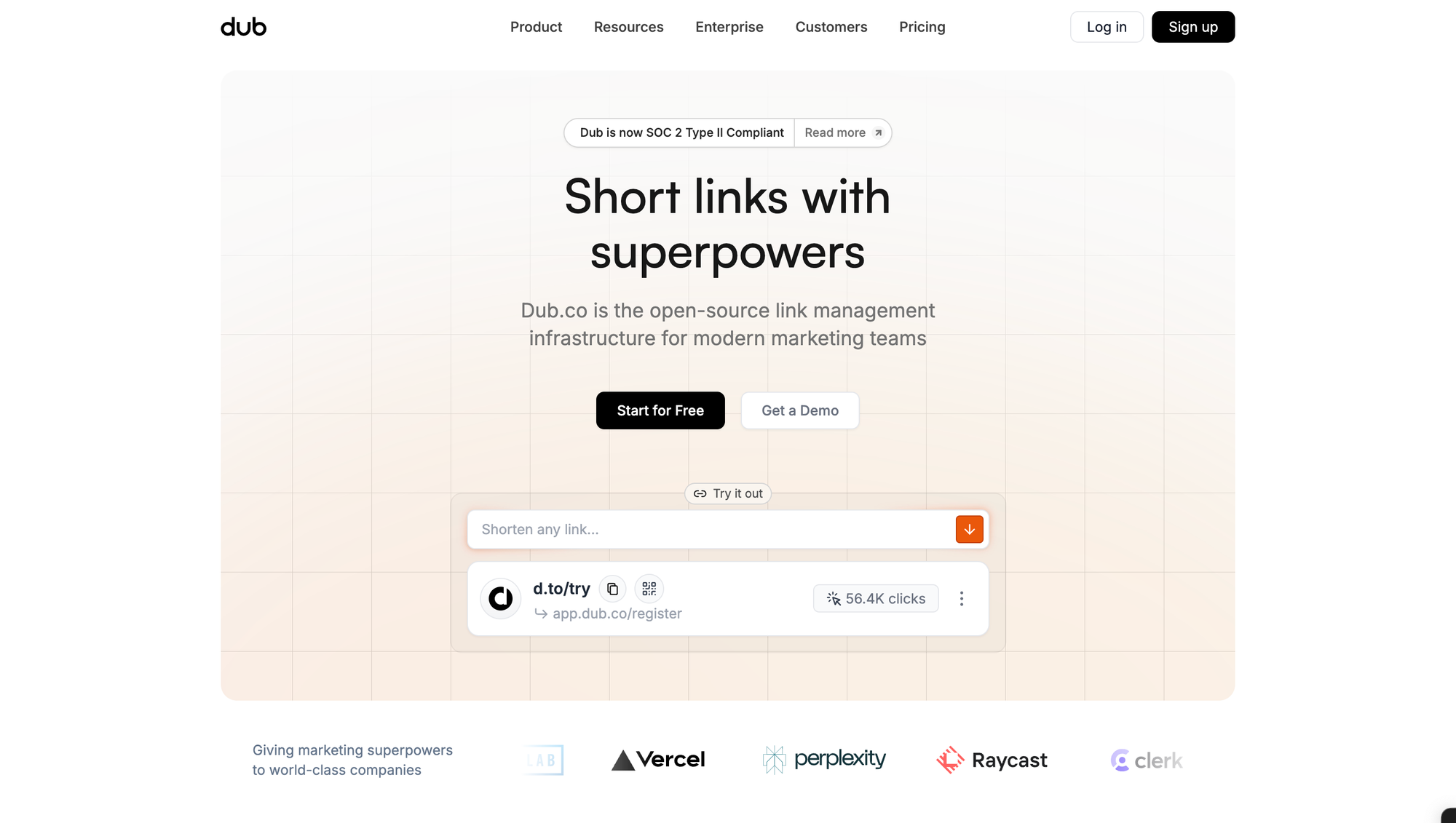
License: AGPL-3.0 | Stars: ~19,000
GitHub | Website | Documentation | Discord
Deployment & Setup: Self-hosted via Vercel/Docker (requires 2+ CPU, 2GB+ RAM, MySQL/PostgreSQL) with unlimited links; Dub Cloud offering with free tier up to 1,000 clicks monthly.
Pricing: Free self-hosted community edition with core link management features; Cloud version starts at $9/month for advanced features (custom domains, team collaboration, priority support).
Core Features & Capabilities
- Link Management: Custom domains, branded links, and bulk URL creation with tags
- Analytics & Tracking: Real-time click analytics with geolocation, device, and referrer data
- Campaign Tools: QR code generation, A/B testing, and bio link pages
- Team Features: Role-based access, link organization, and workspace management
- Developer Tools: REST API, webhook support, and programmatic link creation
Dub.sh earned its spot by reimagining what modern link management should look like in 2025. Built by ex-Vercel engineer, it delivers microsecond-fast redirects and a developer experience that makes decade-old tools like Bitly feel outdated. The project's rapid development cycle consistently ships new features while maintaining exceptional code quality. Its modern tech stack (Next.js 13, Prisma) and thoughtful architecture have redefined expectations for link management tools. With backing from notable investors and a growing commercial presence, Dub.sh exemplifies how a fresh approach to an established problem can create a substantially better solution.
DocuSeal (Document Signing)
DocuSeal is an open source document signing and workflow automation platform that brings enterprise-grade e-signature capabilities to organizations prioritizing data control. Built with security-first architecture, it provides DocuSign-level functionality with features spanning from basic signing to complex multi-party workflows. The community edition offers unlimited document signing for self-hosted deployments, while the Pro version adds team collaboration and advanced automation features.
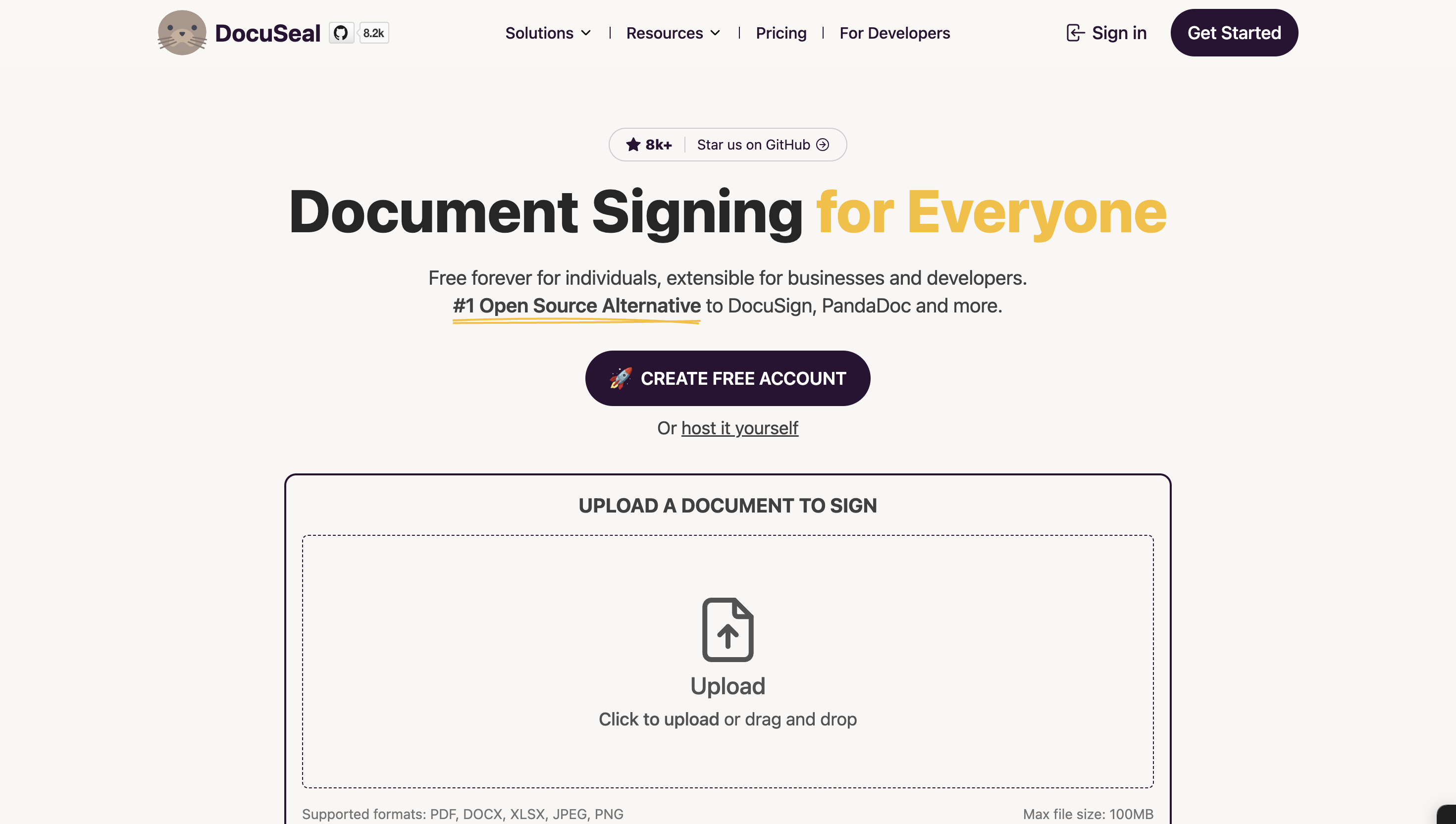
License: AGPL-3.0 | Stars: ~8,200
GitHub | Website | Documentation | Discord
Deployment & Setup: Self-hosted via Docker (requires 2-4 CPU, 4GB+ RAM, SSL certificates) with unlimited documents; Partner-managed cloud options for compliance-focused deployments.
Pricing: Free self-hosted community edition with core e-signature features; Enterprise edition adds compliance modules, SSO, and advanced security features.
Core Features & Capabilities
- E-Signature Infrastructure: Legally compliant signatures with timestamp validation and IP logging
- Document Workflows: Multi-step routing, automated reminders, and custom signing sequences
- Template System: Customizable templates with drag-and-drop fields and reusable components
- Security & Compliance: Comprehensive audit trails, encrypted storage, and tamper-evident seals
- Developer Tools: REST API, webhook integrations, and custom branding capabilities
DocuSeal stands out in 2025 for its unique approach to the e-signature space. Unlike its competitors, it's a bootstrapped project focused on sustainable growth and customer-centric development. Their lean approach and focus on community feedback has resulted in rapid feature development that directly addresses user needs. The project maintains exceptional stability and security while staying true to open source values. DocuSeal demonstrates how a bootstrapped open source project can successfully challenge established players by prioritizing user needs over rapid growth, making it an increasingly popular choice for organizations seeking control over their document signing infrastructure.
Strapi (Headless CMS)
Strapi has earned its position by making headless CMS accessible to teams of all sizes. Their minimal learning curve and intuitive admin panel have driven massive adoption, while maintaining exceptional stability through measured growth. The platform's consistency in releases and thorough documentation makes it reliable for both small projects and enterprise deployments. After years of perfecting their self-hosted solution, their recent cloud offering demonstrates their thoughtful approach to expansion - launching only when they could match their high standards for developer experience.
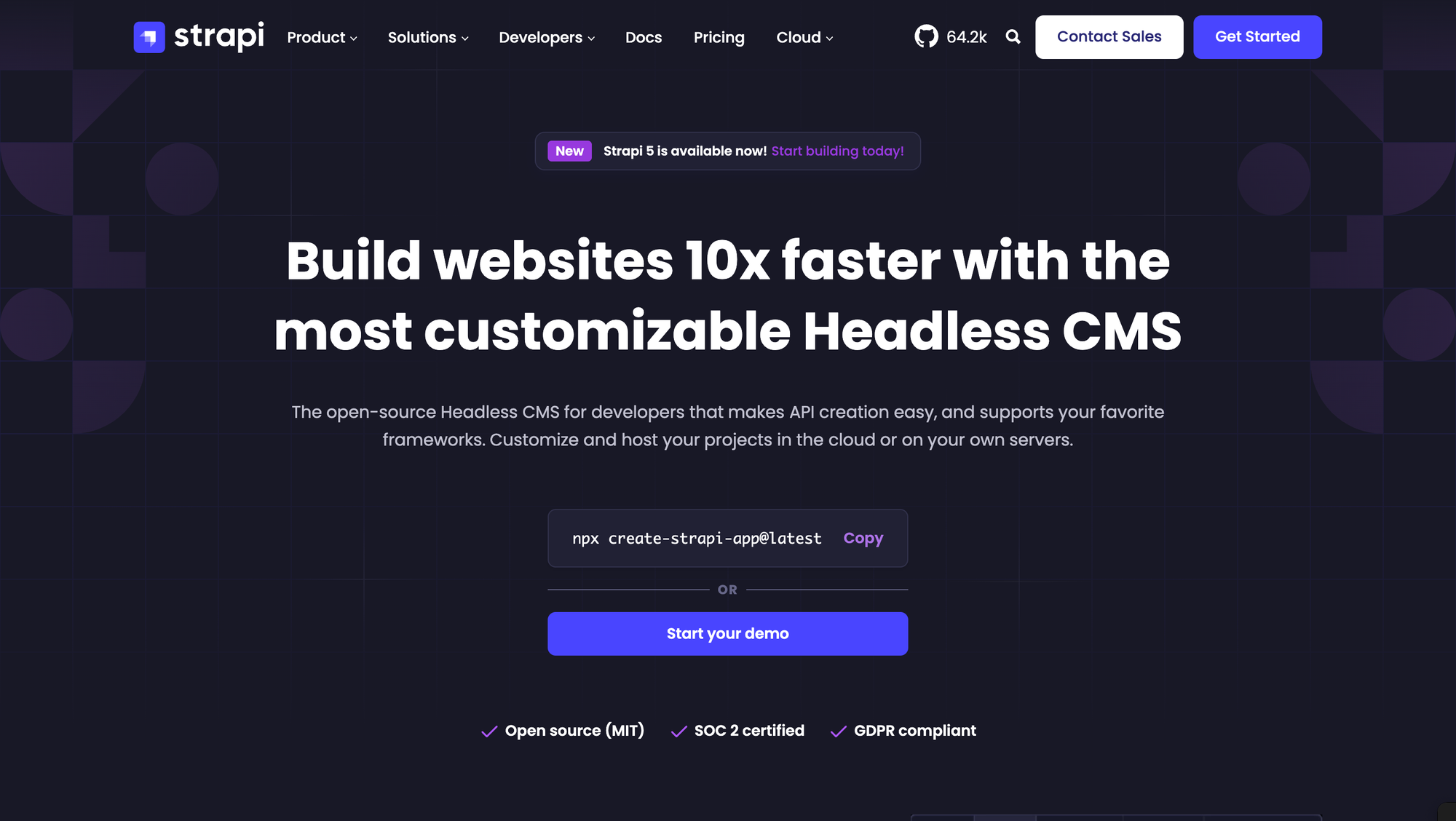
License: MIT | Stars: ~64,000
GitHub | Website | Documentation | Discord
Deployment & Setup: Self-hosted via Node.js/Docker (supports PostgreSQL/MongoDB/MySQL); Strapi Cloud for managed hosting with auto-scaling and CDN.
Pricing: Free self-hosted community edition with complete CMS capabilities; Enterprise edition adds SSO, advanced workflows, and priority support.
Core Features & Capabilities
- Infrastructure Flexibility: Self-hosted deployment options across major cloud providers (AWS, Azure, GCP) or Strapi Cloud for managed hosting
- Developer Experience: Powerful CLI for rapid development, multi-database support (PostgreSQL, MySQL, MariaDB, SQLite), and TypeScript-based architecture
- Admin Interface: Modern, customizable admin panel with drag-and-drop content modeling and extensible plugin system
- API & Integration: Front-end agnostic with automatic REST/GraphQL endpoints, supporting any framework or platform
- Security & Performance: Built-in security policies (CORS, CSP, XSS protection) with Node.js performance optimization
Strapi has earned its position by making headless CMS accessible to teams of all sizes. Their minimal learning curve and intuitive admin panel have driven massive adoption, while maintaining exceptional stability through measured growth. The platform's consistency in releases and thorough documentation makes it reliable for both small projects and enterprise deployments. With 200+ monthly contributors, strong venture backing ($45M raised), and their successful cloud launch, Strapi demonstrates how focusing on developer experience while maintaining sustainable growth creates long-term open source success.
Mermaid (Diagramming and Charting)
Mermaid is an open source JavaScript-based diagramming and charting tool that lets you create diagrams using text and code. It stands out by turning simple text definitions into flow charts, sequence diagrams, Gantt charts, and more using Markdown-like syntax. The library can be used directly in browsers, integrated into documentation systems, or embedded in various platforms. With native support in GitHub, GitLab, and major documentation frameworks, Mermaid has become the de-facto standard for code-based diagramming.
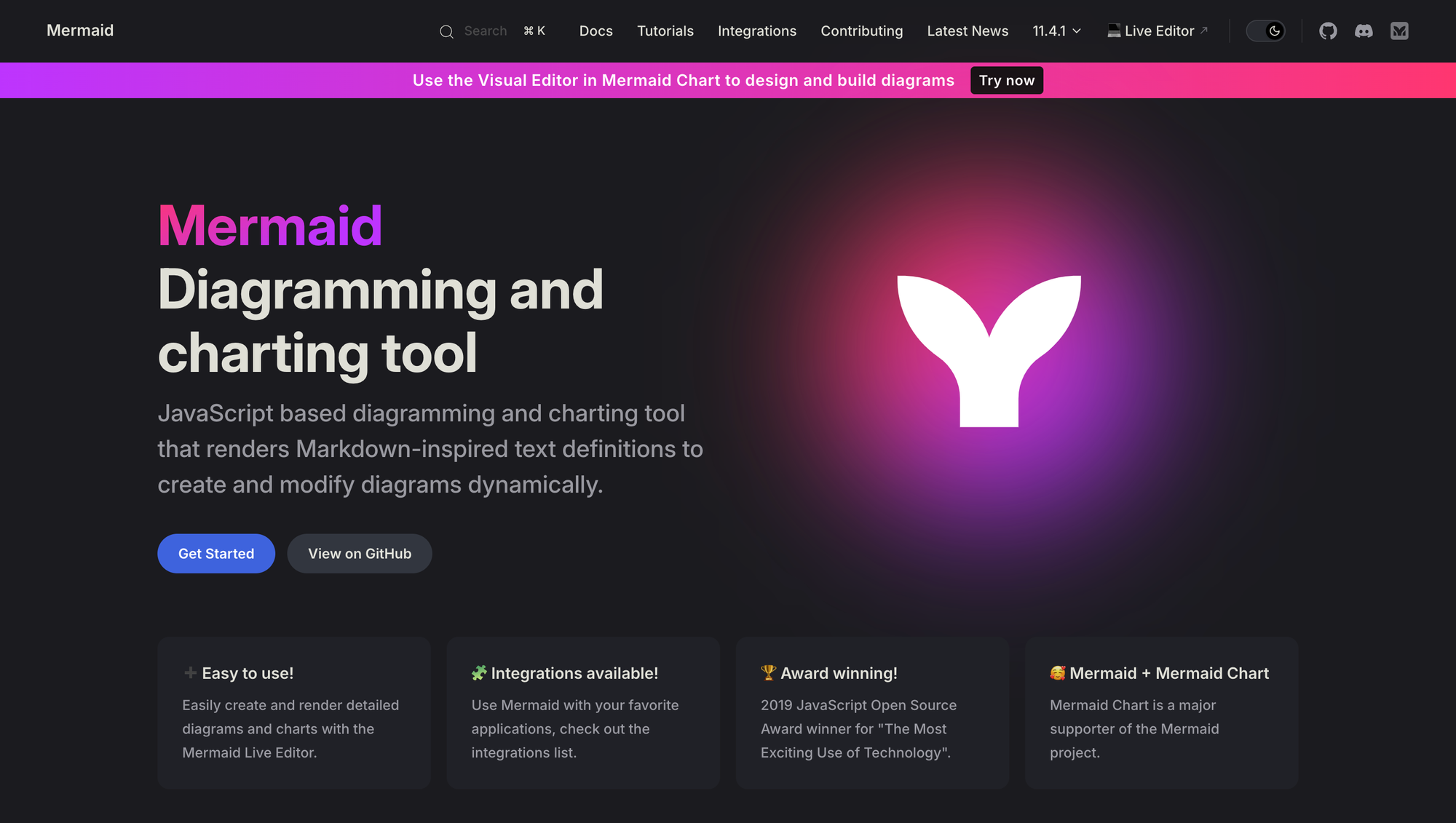
License: MIT | Stars: ~73,400
GitHub | Website | Documentation | Discord
Deployment & Setup: Use via CDN integration (zero setup), npm package for Node.js projects, or CLI tools for static generation. Minimal resource requirements.
Pricing: Completely free and open source; all features available without restrictions.
Core Features & Capabilities
- Diagram Types: Flow charts, sequence diagrams, Gantt charts, entity relationships, user journeys, and more
- Integration Support: Native rendering in GitHub, GitLab, Notion, and documentation platforms
- Live Editor: Browser-based editor for real-time diagram creation and editing
- Customization: Themes, styles, and configuration options for visual customization
- Developer Tools: CLI for diagram generation, API for programmatic usage
Mermaid has earned its place by making diagram creation accessible through code. Its text-based approach aligns naturally with developer workflows, enabling version control and collaboration on diagrams. The project maintains consistent releases while steadily adding new diagram types and integrations. With strong community support and adoption by major platforms like GitHub and GitLab, Mermaid has become a standard tool for technical documentation and presentations.
Listmonk (Email Marketing)
Listmonk is an open source email marketing platform that provides a self-hosted alternative to tools like Mailchimp and Sendinblue. It combines newsletter management, subscriber lists, and campaign analytics in a single lightweight package. The platform offers unlimited subscribers and emails for self-hosted deployments, requiring only a compatible SMTP server for sending emails.
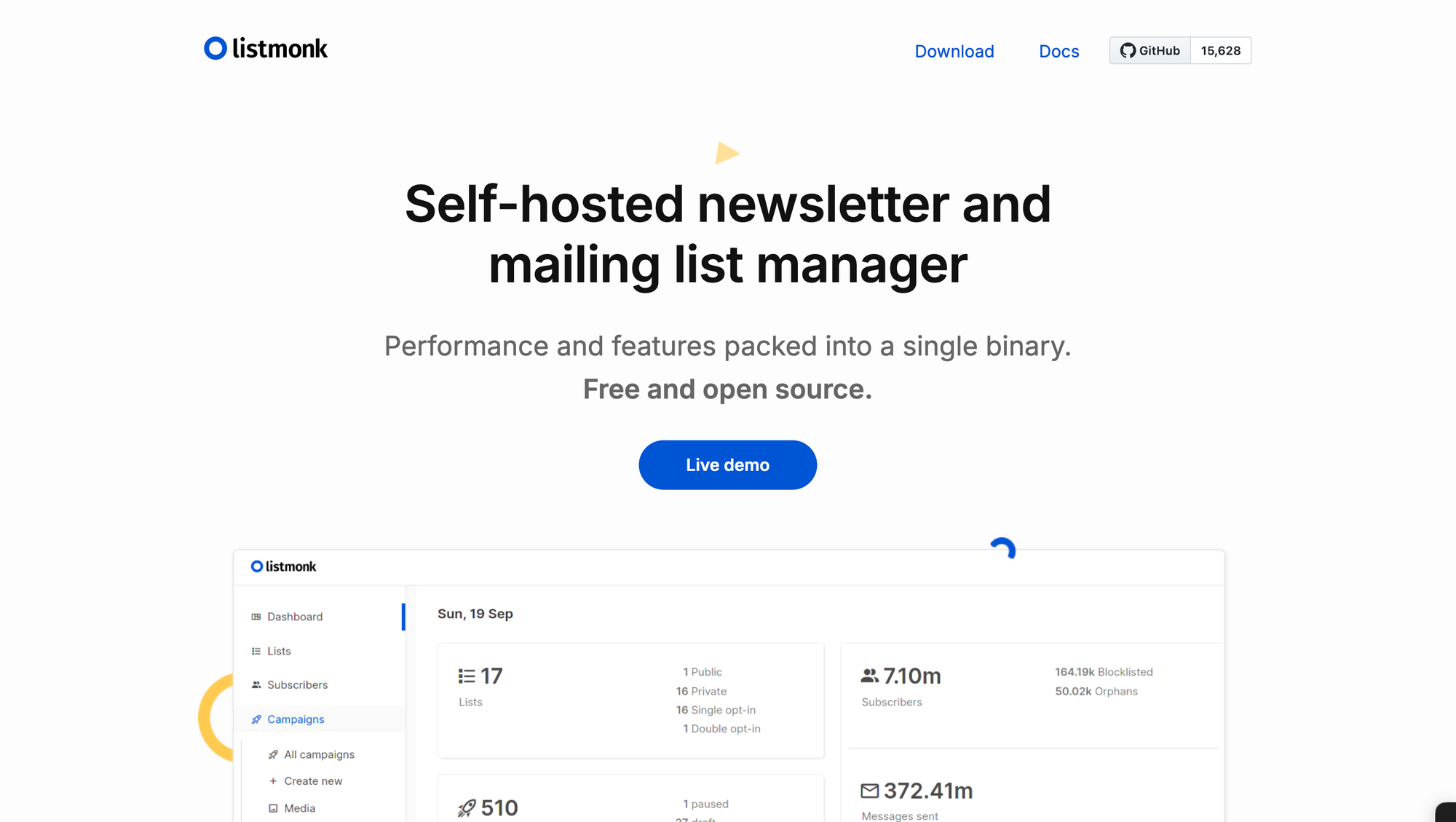
License: AGPL-3.0 | Stars: ~12,000 GitHub | Website | Documentation | Discord
Deployment & Setup: Self-hosted via Docker (requires 1+ CPU, 2GB+ RAM, PostgreSQL); supports any SMTP provider or email service.
Pricing: Completely free and open source; all features available without restrictions. Users only pay for their chosen SMTP service.
Core Features & Capabilities
- List Management: Segmentation, custom fields, and automated subscriber handling
- Campaign Tools: Rich text editor, template system, and dynamic content insertion
- Analytics & Tracking: Open rates, click tracking, and subscriber engagement metrics
- Automation: Basic subscriber workflows, auto-responders, and list management
- Developer Features: REST API, custom template support, and webhook integrations
Listmonk has gained traction through its focused approach to email marketing essentials. The project is notably stable and production-tested, being developed and used internally by Zerodha, India's largest stock broker. While not VC-backed, the backing of a major fintech company and their development team ensures reliable maintenance and updates. The platform's minimal learning curve and straightforward configuration make it accessible for most teams, though it remains strictly self-hosted with no cloud offering. With consistently strong performance, efficient resource usage, and active community engagement, Listmonk shows how specialized tools can excel through simplicity and stability rather than feature bloat.
Midday (Business OS for Solo Entrepreneurs)
Midday is an open source business operations platform providing entrepreneurs multiple tools to run their business. Built with transparency and user collaboration at its core, Midday combines client management, financial tools, and project tracking in one cohesive system. It serves as a bridge between entrepreneurs and their accountants, helping streamline tedious tasks while providing deeper business insights. The community edition offers complete functionality for self-hosted users, while the cloud version provides a hassle-free managed solution.
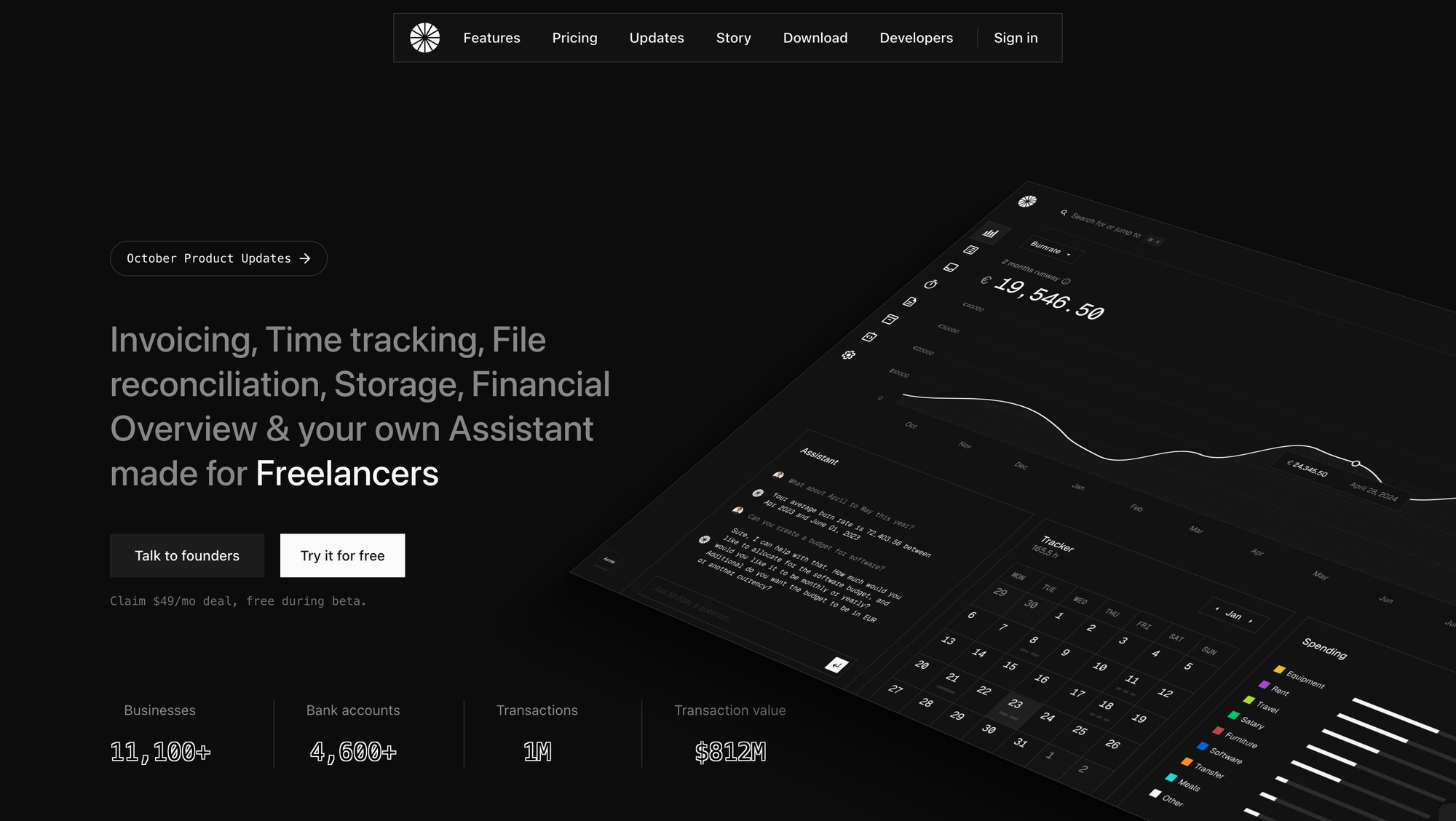
License: MIT | Stars: ~6,300
GitHub | Website | Documentation | Discord
Deployment & Setup: Only local avaiable
Pricing: Free on local dev; Cloud version starts at $15/month with premium support.
Core Features & Capabilities
- Time Management: Live project tracking with collaborative features and comprehensive project overviews for productivity insights
- Financial Organization: Automated invoice/receipt matching with transactions and seamless CSV exports for accounting
- Document Handling: Secure vault for contracts, agreements, and business documents with easy retrieval
- Business Intelligence: AI-powered assistant providing financial insights, spending analysis, and cost optimization
Midday has carved its niche by focusing specifically on solo entrepreneurs' needs. The project maintains regular updates with features driven by real user feedback from freelancers and consultants. Their simplified approach to business management tools addresses a gap between personal productivity apps and complex enterprise solutions. With a bootstrapped development model and growing community adoption, Midday demonstrates how targeted tools can effectively serve specific business segments.
The open source landscape of 2025 reveals several compelling trends through our examined projects. Most notably, we're seeing the success of diverse business models – from venture-backed platforms like Plane, PostHog, and Strapi to bootstrapped successes like DocuSeal and Listmonk. This variety proves that open source sustainability isn't tied to a single funding approach, but rather to how well projects serve their users' needs.
These projects share a common thread in their focused approach to solving specific problems. Rather than competing on feature quantity, they excel in their chosen domains: Plane simplifies project management without the bloat, PostHog delivers comprehensive product analytics with privacy controls, DocuSeal handles document signing with full data sovereignty, Strapi makes headless CMS accessible to all team sizes, and Listmonk provides essential email marketing without complexity. Each project offers both self-hosted and cloud options, providing flexibility as organizations grow.
What truly sets these projects apart is their approach to growth and community. Many took time to perfect their core offerings before expanding to cloud versions, maintaining exceptional documentation and regular release cycles throughout. This careful balance between community engagement and commercial viability has created a new standard for open source development. Their success demonstrates that focusing on stability and user needs trumps rapid feature expansion.
The impact on enterprise software is clear – open source has evolved from being merely a cost-saving alternative to becoming the preferred choice for critical infrastructure. These projects prove that maintaining transparency and community collaboration while building sustainable, user-focused products isn't just possible – it's the future of software development. As we move forward, this approach to building open source software is reshaping how enterprises evaluate and adopt technology solutions.
